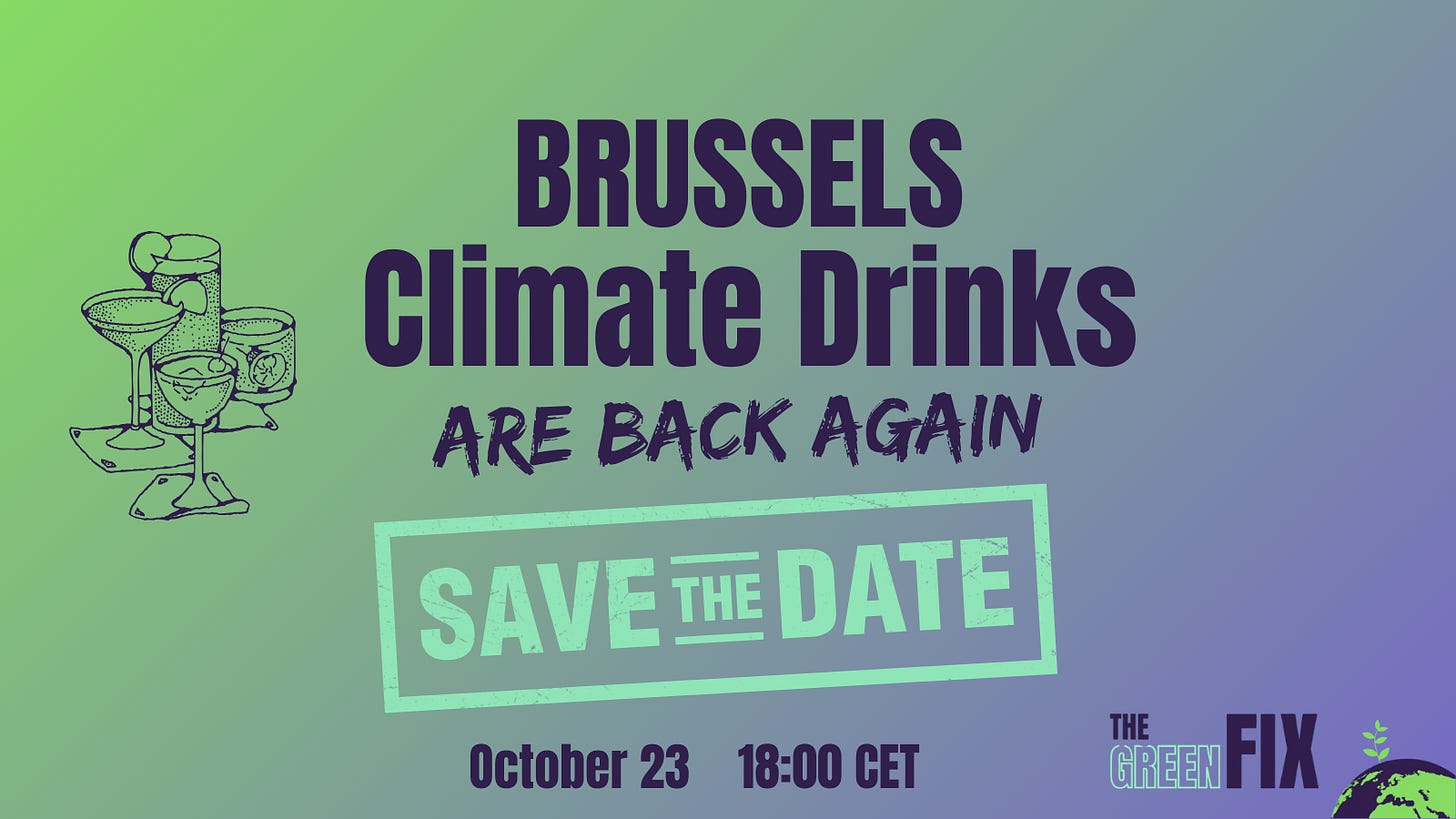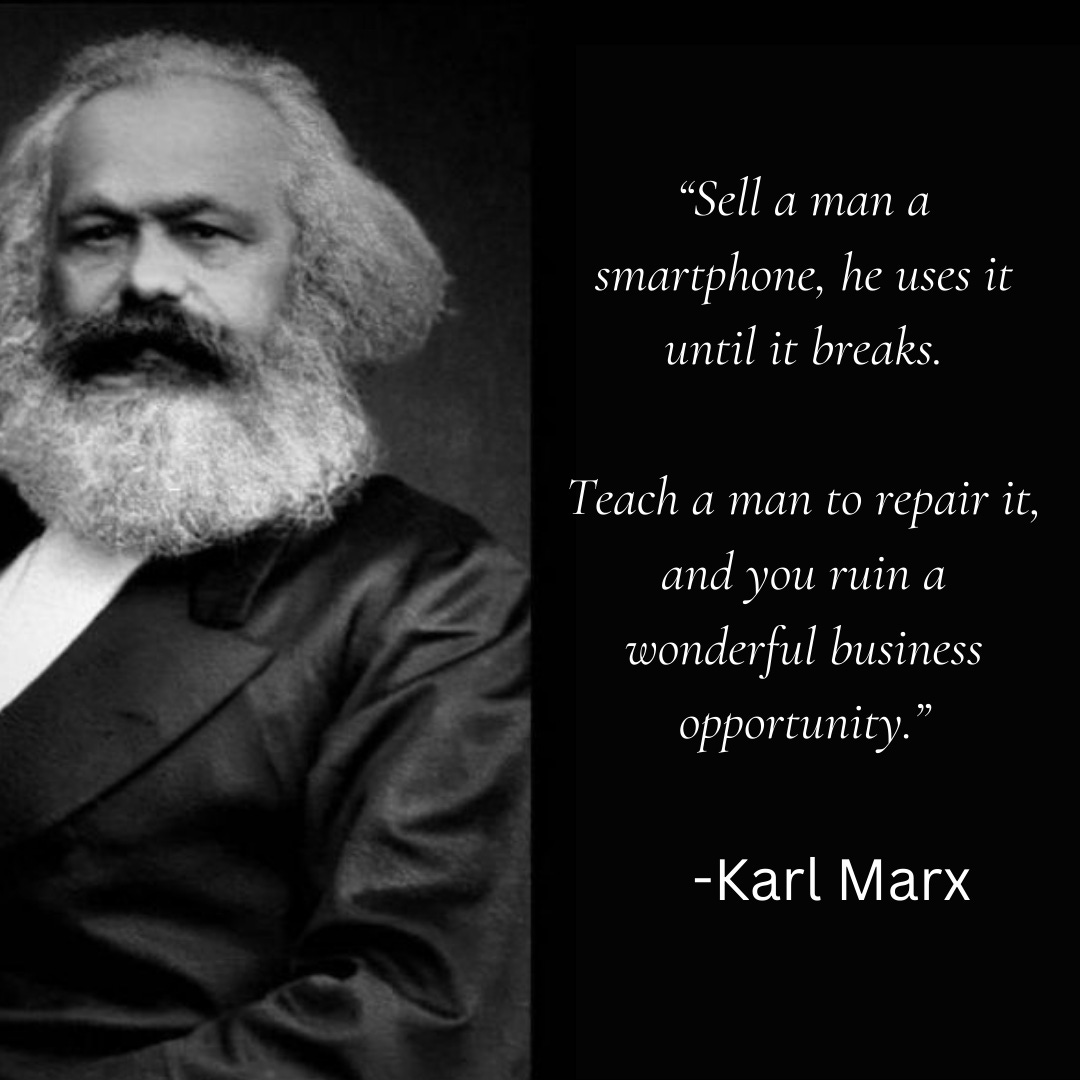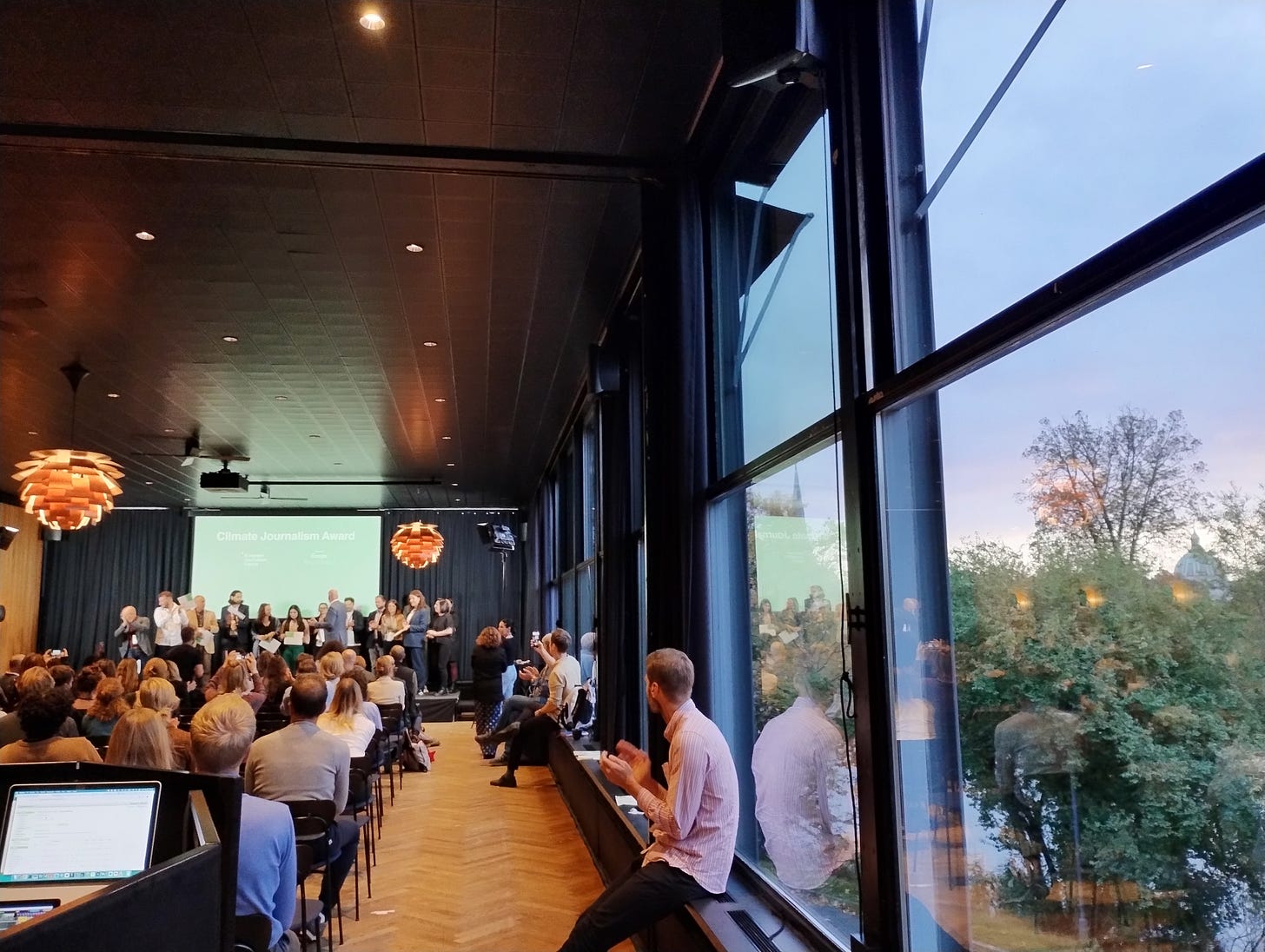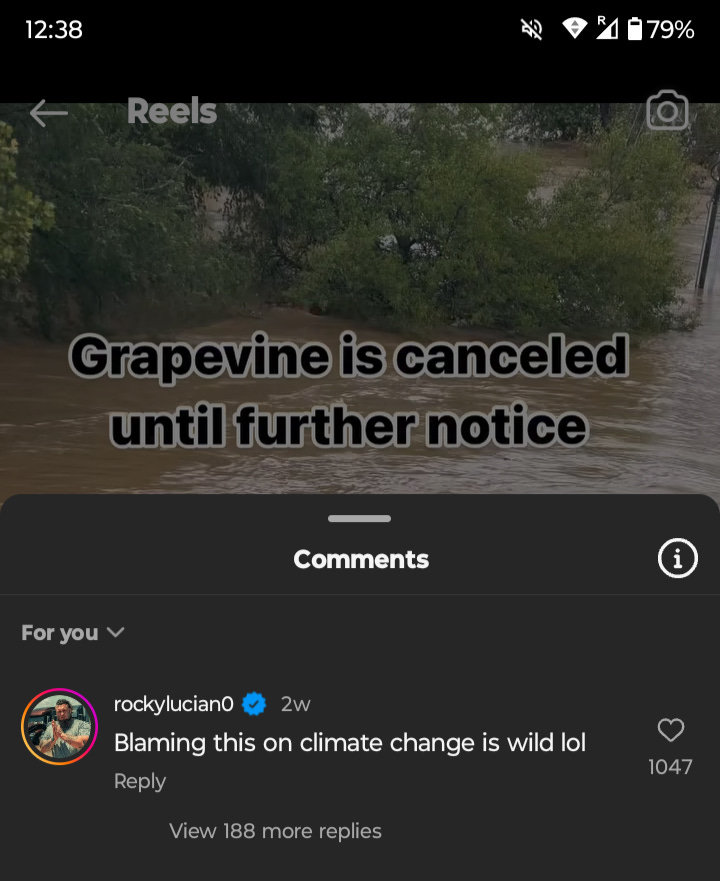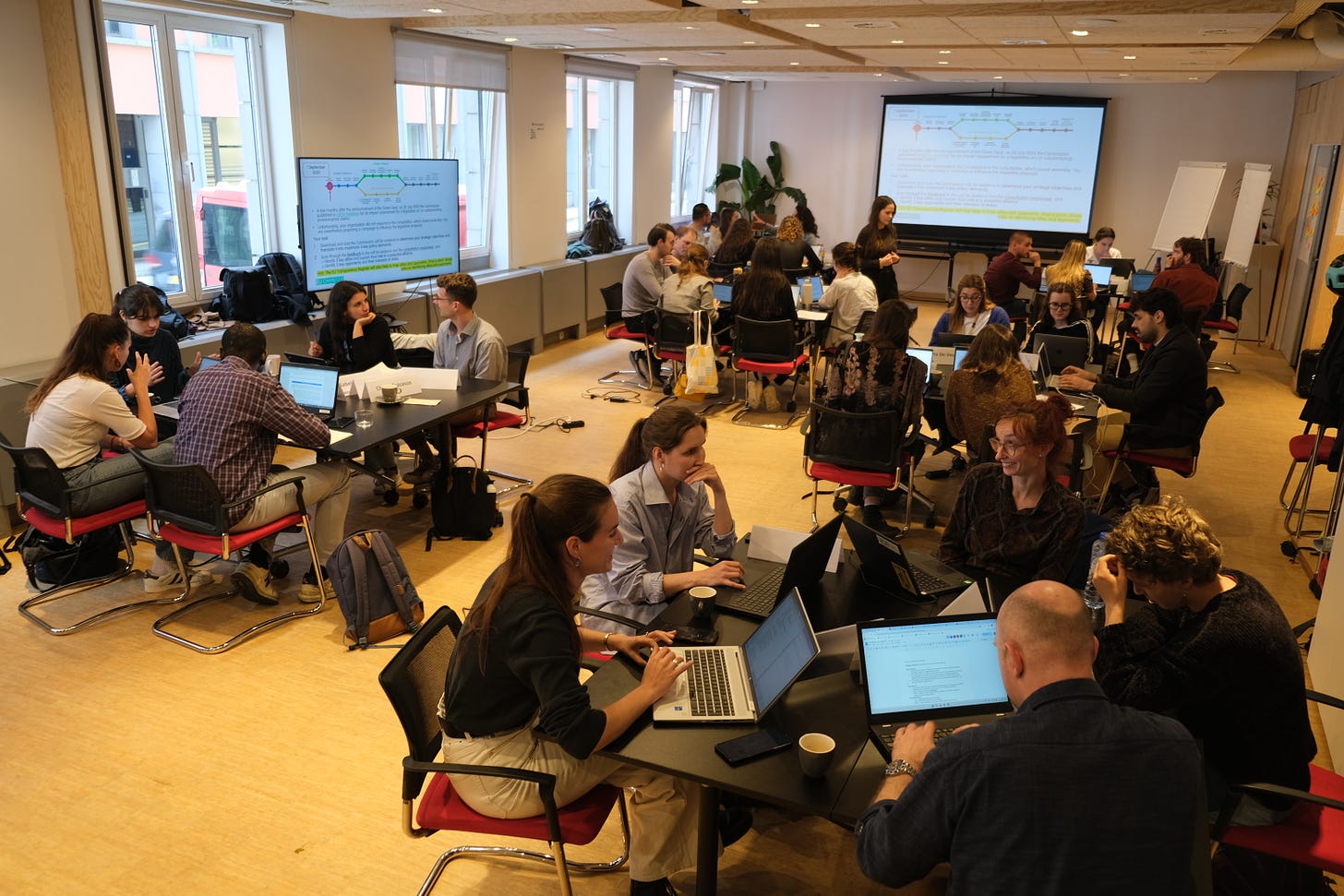Faking it: How to support truthful climate journalism when governments would prefer you didn't
Plus, a note on reclaiming repair as a form of rebellion.
Event Alert: Brussels Climate Drinks, 23 October!
Find out more and get your free tickets here to our agenda-free climate drinks where you can opt in or out of networking, depending on your mood.
Today’s introduction is written by Brussels-based environmental activist João Antonucci Rezende.
I wonder if we can actually fix the world with a screwdriver and a hammer.
The approaching International Repair Day makes me wonder: wouldn't it be nice to fix all the systemic oppressions with the good ol' "turn it off and on again"?
I have been working on the right to repair for over a year and I feel that once again our institutions are constantly letting us down for the benefit of capitalism, as often happens when talking about environmental policies. Discussions revolve around the profit that big companies could make from it, and not around the many social and environmental benefits that don't fulfill the capitalistic necessity of maximising profit.
Repair is such a threat to the economic system, that big tech companies are doing anything to prevent citizens from having the tools and the means to repair their devices. These companies constantly use physical and electronic barriers (gluing different parts of the device, selling spare parts for unaffordable prices, adding parts that are linked to the specific device, etc.) that obstruct the users’ right to repairs.
If it's true that if you can't fix it you don't own it, then neo-liberalism has reached a level of failure where owning your own device is considered asking too much: too busy protecting their profits, liberals have lost their precious right to private property.
By preventing us from repairing, the system stole a fundamental aspect that characterises us as human beings (some bearded man would consider this phenomenon part of the “alienation”). That's why we must reclaim repair as a symbol of ecosocialism and a tool of self-determination to be used in the latest iteration of the class struggle.
It's in this context that repair cafés, spaces where anybody can bring their objects to get repaired for free, were born. Repair cafés changed my vision of society, and I hope they change yours as well.
Repair cafés are much more than simple workshops: they are horizontal networks based uniquely on solidarity and a good example of post-growth societies that should be replicated everywhere across the world. Local communities where people make their knowledge and skills available for free for everybody.
I like to see repair as a means to dismantle capitalism: when we opt for repair instead of replacing we are reducing consumption, breaking oppressive cycles and creating solidarity, three important instruments that we could use to overcome capitalism, and a universal right to repair is the modern way to seize the means of production.
When I'm in a repair café, seeing everybody working together for the common wellbeing without asking anything in exchange, I see that there is still kindness in this world, and I feel that maybe we'll make it.
This is a call to resistance against our oppressive systems through local communities based on solidarity that can emerge in many forms, among them Repair Cafés.
Next time something breaks, go find a community in the closest Repair Café. And if in the meantime you make some CEO mad because you are taking ownership of the devices you paid for instead of buying a new one from them, that's a further victory.
The Green Fix is free because we believe climate information should have no barriers. But if you have the means, please consider tipping us a virtual coffee to support us.
What’s Going On?
Unprecedented Niger floods displace 1.1 million as devastation grows.
Related: Florida criminalised homelessness. Then came hurricanes Helene and Milton.
‘State of the planet’ scientist report urges dramatic climate action to avoid risk of social breakdown.
Related: Why science can’t be separated from activism - opinion piece.UK’s £22 billion carbon capture pledge follows surge in lobbying by fossil fuel industry.
Related: Ex-carbon offsetting boss charged in New York with multimillion-dollar fraud.Wildlife populations have dropped 73% since 1970, with habit degradation and intensive agriculture key causes.
Related: On Navajo land, ancient ways are restoring the earth.Half of global energy demand on track to be met by renewable energy by 2030.
Related: How this Belgian town slashed household waste.
Focus On… Climate Journalism in the era of Misinformation
Cass Hebron attends the News Impact Summit in Copenhagen on fighting climate misinformation.
“If you make it trend, you make it true.”
Renée DiResta, Director of Research at New Knowledge, and Head of Policy at the nonprofit Data for Democracy.
Last week I attended the European Journalism Centre’s yearly News Impact Summit. This year’s theme: Fighting Climate Misinformation.
I had had very little sleep when I arrived. Even though I try to steer clear of American climate politics, feeling that the EU and UK are already enough anxiety fuel, the night of the 9th October I was sucked into an internet abyss about Hurricane Milton.
With hours to go before the second-ever strongest Atlantic hurricane would arrive in Florida, my Instagram was suddenly full of residents from Tampa and the surrounding area explaining why they were not evacuating. A skincare influencer mum did a ‘closet makeover’ showing how she had re-organised the closet to make space for her and her two kids and food and water supplies, to live in until it was safe to re-emerge. A 26-year-old man talked into a mic on the bay in pouring rain to give us a discount on his betting services with the promo code MILTON.
Dude is cooked right? the comments said.
On X, a debate raged about whether the hurricane was ‘engineered’ by the US government (which would show unprecedented scientific skill for a catastrophically mismanaged nation), and on Trump’s unfounded accusation that Kamala Harris had diverted emergency relief funds to support people arriving in the US without papers (she hadn’t. Obviously).
It’s not just the US. Charles Terroille of Science Feedback presented an investigation at the conference, that found that during the farmers’ protests from December 2023 to May 2024, there was a surge in Facebook posts attacking EU climate action policies and implying an anti-farmer government conspiracy. 81.6% of these were posted by far-right political parties.
Real and engaging climate journalism is hard: be realistic without being depressing, and write about all the things that governments and corporations are trying to stop you from saying.
In a panel debate, the editors of two Danish newsrooms - Amelie Kestler of Politiken and Ingrid Tinmannsvik of NRK - spoke about how young readers were avoiding news altogether: 23% of them, according to a study by Reuters. Nobody wants to read an overwhelming and neverending stream of hellishly depressing content.
On the ground, even getting the story out is hard.
“We were chased by a group of men with axes,” Mihail Gavril Dragolea, journalist and videographer from Romania, told us. “For gathering evidence of wood theft in Romania.”
Leyla Mustafeyeva, journalist at Abzas Media in Azerbaijan, told us how several of her colleagues faced up to 12 years in prison for their investigations into corruption among the political elite. In the run-up to being the host of the next UN climate conference, Azerbaijan has arrested several more climate justice activists and journalists under fabricated drug charges.
All this misinformation, news avoidance and journalist repression has real-world consequences. From the people on the ground in Tampa who face fatal consequences if they trust the wrong information, to the delay of crucial climate policies at the government level.
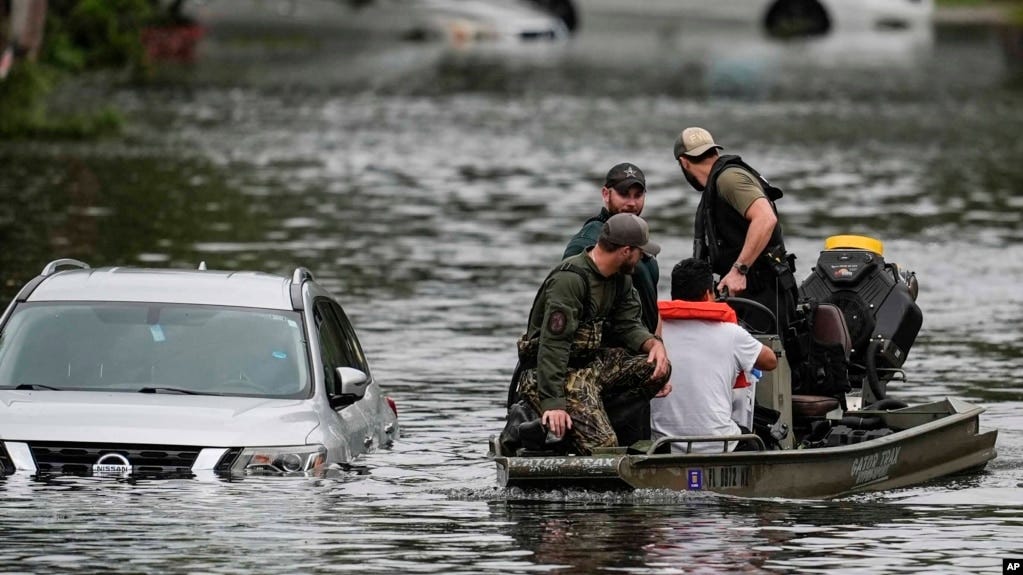
So what can we do in the face of these challenges? How do we get the truth out?
There was too much to unpack in the conference than I can say in one post. I can share my notes with anyone interested (just reply to this email). But here are a few:
While the EU and governments procrastinate any meaninful action to crack down on misinformation, we also have the power to “make it trend to make it true.”
For journalists, there are several platforms supporting anyone at risk of persecution as a result of their work - such as the Forbidden Stories platform pursuing investigations of journalists who have been silenced, and the guides by Croatian platform Faktograf to support researchers and writers with the risks of publishing.
We also heard about the UN campaign ‘Verified Champions,’ which supports climate experts to become influencers and shift the narrative on climate change. It turns out we might need TikTok videos to help fix the world.
And what about combating reader news avoidance and paralysis?
NRK and Politiken have been experimenting with ways to re-engage readers, including a crucial shift away from investigation alone - which aims to expose corruption - into constructive journalism, which focuses on highlighting solutions and explaining what is going on rather than throwing scientific terms at an overwhelmed audience.
(Side note: I was trained in solutions journalism by social enterprise magazine Pioneers Post before I moved to Brussels and it has informed my approach to The Green Fix and all climate writing).
Constructive journalism and catchy Instagram Reels aren’t directly tackling misinformation, per se, but we can’t hope to combat sticky lies with scientific reports. People have to want to listen.
I’ve ignored most American news in the last weeks because I couldn’t handle hearing about additional fossil fuel disasters - until I was listening to one woman I’ve never met in my life and never will, talking about how she would sleep in her cupboard. Then I had the energy to listen and to Google and ask myself, What can I do? How do we stop a hurricane? How do we show that another world is possible?
[Ad] EU Academy: ‘Europe’s choice: public interest vs political capture’. Brussels, 28-29 November - Register now!
In the 12th edition of our interactive and practical two-day training for public interest advocates, we’ll explore the new EU political and institutional landscape after the June European elections and take a critical look at the von der Leyen II Commission and its priorities.
The aim is to boost the strategic insight and advocacy skills of those defending public interest causes across Europe. The team of trainers includes Marc-Olivier Herman (EUChanger & Oxfam), Joost Mulder (Better Europe), Francesca Gater (ZOE Institute for Future-fit Economies) and insiders from the EU institutions.
To download the detailed programme with the trainers’ bio and find out more on the venue, pricing and registration, visit our website here.
Questions? Mail us at euacademy@euchanger.org.
—
The Green Fix is now offering low-cost sponsored slots on the newsletter. Book your slot by emailing wearethegreenfix@gmail.com.
So Now What Do I Do?
LEARN SOMETHING
Read: How to think about politics without wanting to kill yourself, by
.Listen: A podcast episode on how disabled people experience climate disasters.
Listen/Read: Why toxic lies are running rampant after Helene and Milton, an interview with a crisis management expert.
TRY SOMETHING NEW
The European Youth Summit has a call for youth organisations to organise events. Info session on 16th October at 16h CEST (today).
Check out the upcoming summit on Reframing Climate Justice from 21-23 October in Denmark [previous talks are already online].
CHANGE THE SYSTEM
Sign the European Citizens’ Initiative for free and accessible abortion for everyone in Europe.
Sign the petition to ban fast fashion advertising in the European Union.
Brussels: Join us at the Action for Life protest from 14h on 19th October.
Stay in the loop
You can follow us on Twitter @TheGreenFix, Instagram @thegreenfix_ and LinkedIn. Connect with Cass on Instagram @cass.hebron and LinkedIn Cass J Hebron.





